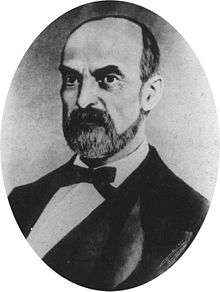Giovanni Lanza
| Giovanni Lanza | |
|---|---|
 | |
| 8th Prime Minister of Italy | |
|
In office December 14, 1869 – July 10, 1873 | |
| Monarch | Victor Emmanuel II |
| Preceded by | Luigi Federico Menabrea |
| Succeeded by | Marco Minghetti |
| Personal details | |
| Born |
February 15, 1810 Casale Monferrato, Piedmont |
| Died |
March 9, 1882 (aged 72) Rome, Latium |
| Political party | Historical Right |
| Signature |
|
Domenico Giovanni Giuseppe Maria Lanza (February 15, 1810 – March 9, 1882) was an Italian politician and the eighth Prime Minister from 1869 to 1873.
Lanza was born in the Piedmontese city of Casale Monferrato. He studied medicine at Turin, capital of the Kingdom of Sardinia, then returned to Casale where he divided his energies between practising medicine and developing his 33 hectare estate in nearby Roncaglia. He studied and wrote on agriculture developments in both the practical and social aspects. Lanza was among the first in Monferrato to introduce modern equipment as iron ploughs and seed drills, and also involved himself in the agricultural education of poor children, hoping to achieve at once “the betterment of our agriculture and the moral and intellectual betterment of our agricultural workers.”[1]
Lanza was also an active member of the Subalpine Agricultural Association of Turin and became its secretary. The association was concerned for reform in the political and economic spheres, as well as in that of agriculture, and its identification with the cause of liberal nationalism—with the Risorgimento—was underlined at the September 1847 agrarian congress in Casale, when Lanza raised the cry of “Viva l’Italia libera ed indipendente!” Later he commented on that event: “I did not join the association purely to improve the cultivation of cabbages.”[2], [3]
Lanza took an active part in the rising of 1848 and was elected to the Piedmontese parliament in that year. He attached himself to the party of Cavour and devoted his attention chiefly to questions of economy and finance. He became minister of public instruction in 1855 in the cabinet of Cavour, and in 1858 minister of finance.[4]
Lanza followed Cavour into his temporary retirement in July 1859 after the Treaty of Villafranca, and for a year (1860–1861) was chairman of the House. He was minister of the interior (1864–1865) in the La Marmora cabinet, and arranged the transference of the capital to Florence. He maintained a resolute opposition to the financial policy of Menabrea, who resigned when Lanza was a second time elected, in 1869, chairman of the House.[4]
Lanza formed a new cabinet in which he was himself minister of the interior. With Quintino Sella as minister of finance he sought to reorganize Italian budget, and resigned office when Sella's projects were rejected in 1873. His cabinet had seen the accomplishment of Italian unity and the installation of an Italian government in Rome after the defeat of the Papal States in late 1870.[4]
Notes
- ↑ Crosio, Roberto, ed. (2003–2005), "Il ruolo storico dell'Associazione Agraria Subalpina ed i rapporti di Cavour al suo interno", Le vocazioni ambientali del Vercellese e l'opera di Camillo Cavour, archived from the original on 2008-02-20, retrieved 2008-06-24.
- ↑ Coaloa, Roberto (2008-05-28), "Lanza e "Viva l'Italia" al Congresso agrario", Il Monferrato, Editrice Monferrato S.r.l., retrieved 2008-06-24
- ↑ "Il fondatore: Vincenzo Luparia". Istituto tecnico agrario V.Luparia. Retrieved 2008-06-27.
- 1 2 3
 One or more of the preceding sentences incorporates text from a publication now in the public domain: Chisholm, Hugh, ed. (1911). "Lanza, Domenico Giovanni Giuseppe Maria". Encyclopædia Britannica. 16 (11th ed.). Cambridge University Press. p. 188. Endnote: See Enrico Tavallini, La Vita ed i tempi di Giovanni Lanza (2 vols., Turin and Naples, 1887).
One or more of the preceding sentences incorporates text from a publication now in the public domain: Chisholm, Hugh, ed. (1911). "Lanza, Domenico Giovanni Giuseppe Maria". Encyclopædia Britannica. 16 (11th ed.). Cambridge University Press. p. 188. Endnote: See Enrico Tavallini, La Vita ed i tempi di Giovanni Lanza (2 vols., Turin and Naples, 1887).
| Wikimedia Commons has media related to Giovanni Lanza. |
External links
| Preceded by Luigi Cibrario |
Piedmontese Minister of Education 1855–1858 |
Succeeded by Carlo Cadorna |
| Preceded by The Count of Cavour |
Piedmontese Minister of Finances 1858–1859 |
Succeeded by Giovanni Battista Oytana |
| Preceded by Urbano Rattazzi |
Chairman of the Piedmontese Chamber of Deputies 1860 |
Succeeded by Urbano Rattazzi |
| Preceded by Ubaldino Peruzzi |
Italian Minister of the Interior 1864–1865 |
Succeeded by Giuseppe Natoli |
| Preceded by Adriano Mari |
Chairman of the Italian Chamber of Deputies 1867–1869 |
Succeeded by Giuseppe Branchieri |
| Preceded by Federico Luigi Menabrea |
Prime Minister of Italy 1869–1873 |
Succeeded by Marco Minghetti |
| Preceded by Antonio Starabba di Rudinì |
Italian Minister of the Interior 1869–1873 |
Succeeded by Gerolamo Cantelli |
.svg.png)
